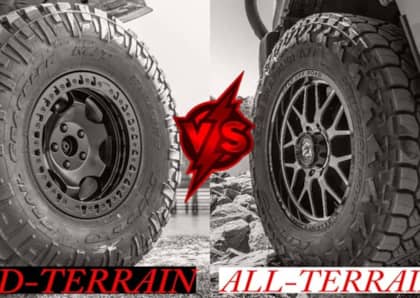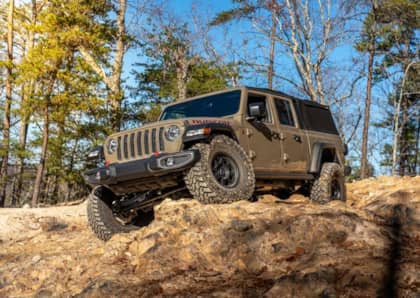Overlanders Love Gear: When Does Weight Become an Issue?
For some people, getting away from it all on an overlanding trip quickly turns into an attempt to bring it all with them. Overpacking and overlanding go hand in hand, especially for first-timers who aren't entirely sure what they should be preparing for on a trip down the trail.

Unfortunately, too much weight in an overlanding rig can negatively impact not just your weekend stress levels, but also your safety, fuel mileage, and even your ability to drive your truck or SUV where you want to go. Here's a look at why you should avoid packing to the point that you become an overweight overlander.
Overweight Overlanding: A Safety Issue
Every truck and SUV leaves the factory with a gross vehicle weight rating (GVWR) stickered somewhere on the chassis that indicates just how much total mass the platform is capable of handling safely. Think of the GVWR number as representing the weight of the vehicle itself, plus the passengers, cargo, and any trailer weight it might hauling, which together represents the ceiling for safety when you head out onto the trail.

It might at first seem unlikely that you could pack so much gear into an overlanding rig that you'd risk surpassing its GVWR, but it's surprisingly easy to overlook areas where weight can creep in. Water, for example, checks in at roughly 8 pounds per gallon, which means even 10 gallons of liquid along for the ride is another 80 pounds of cargo. Passenger weight can add up quickly, too, and so can extra batteries (especially lead-acid 12-volt designs), steel replacement bumpers (typically hundreds of pounds, particularly if a winch is installed), and additional spare tires (up to 90 pounds, depending on the size).

There's also the question of where that weight is placed. Roof racks and bumper racks do a great job expanding the carrying capacity of any overlanding rig, but they also shift the center of gravity of a vehicle. On a lifted truck that can introduce additional tendency to tip or rotate in unpredictable ways.
Overweight Overlanding: A Mileage Issue
Every pound of weight that's added to an overland vehicle is going to impact overall fuel efficiency. While that might not matter that much on the road, once you've hit the trail and find yourself miles from the nearest gas station you're going to be that much more conscious of how much cruising range is available to you. Sure, you can bring extra fuel with you—and you probably should—but the extra mass of those full jerry cans will have an impact, too

Being conscious about loading up an SUV can ensure that you spend that much more time having fun instead of being forced to keep a light foot on the accelerator to save enough fuel to make it out of the woods again at the end of the weekend.
Overweight Overlanding: A Capability Issue
Remember what we mentioned above about weight distribution and how it can impact safety on the trail? While an excess of pounds concentrated in the wrong place can ruin your day very quickly should your overlanding vehicle find itself off-balance, extra weight overall will also reduce its abilities in nearly every situation.

An overweight overlander will have trouble working its way across loose surfaces like sand or mud, bogging down more easily. It will also put additional strain on the engine and transmission in almost all scenarios, especially when traveling up an incline or attempting to traverse uneven, rocky terrain. It's easy to get into a situation where the amount of mass that must be moved overpowers the vehicle's cooling system (especially in warmer climates), not to mention the heat that can be generated inside an automatic transmission due to gear slippage under load.
Where To Draw The Line?
It's natural to want to prepare for every possible scenario when planning an overlanding trip. That kind of maximalist packing, however, only leads to scenarios where you're dealing with an overloaded rig that sucks down fuel at an alarming rate, has trouble on the trail, and forces you to dig through a collection of gear you don't need to get to the few items that you actually do.

Being deliberate in your packing will keep things simple and safe wherever you go, and it will also significantly reduce the amount of stress on both you and your truck. Do a reality check before you leave to see if you actually need all of the things you've stuffed into your vehicle, and determine whether a more focused packing list that takes into account the situations you are most likely to encounter would be a better idea.

If you feel like you simply can't do without certain items, or want to have the comfort of an overstocked vehicle, look to save weight where you can outside the cargo bay. Synthetic winch cables and aluminum bumpers versus steel, a lightweight exhaust system, and lighter all-terrain tires are all options for keeping mass in check.

Finally, don't be shy about visiting the scales after loading up to make sure you're within the safety margins imposed by your SUV's gross vehicle weight rating. You can usually access commercial scales at weight stations or truck stops in your area if you don't know anyone with a set of small mobile scales you can borrow.











